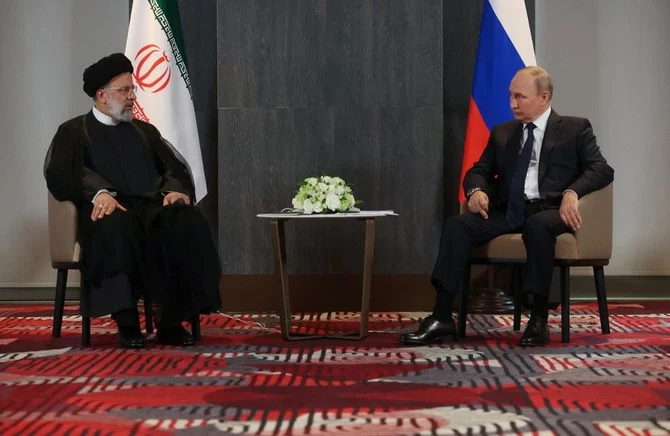
- ARAB NEWS
- 24 Apr 2024

For political scientists studying political systems, misconceptions are one of the most dangerous potential pitfalls and are capable of leading to misleading conclusions. In the context of Iran, there are mounting calls to suspend cooperation with Russia in the latter’s military operation in Ukraine.
Key Iranian actors have noted the negative impacts of this cooperation and they believe it has added to the multiple ongoing crises gripping the domestic front. The number of complaints about this Iranian misconception are growing, particularly among the Iranian hard-liners who have seized control of all the levers of power in the country; they are extremely concerned at the continuing cooperation with Russia.
For example, in an editorial titled “Why are they angry at Zelensky?” columnist Mohammed Javad Pahlavan argued that the official Iranian assessment of the future of the war in Ukraine was incorrect. The columnist asserted that this misconception and underestimation of the Ukrainian situation added a new error to a long chain of Iranian misconceptions.
The editorial emphasized that this misconception, which was primarily caused by the regime’s failure to correctly assess Russia’s inability to militarily annex Kyiv within a week, reflected a disastrous underestimation of Ukraine’s president and of his country’s ability to resist the Russian military machine. On the ground, as Pahlavan pointed out, no such lightning annexation of the Ukrainian capital occurred. The columnist further noted that, despite 10 months passing since the war began, Russia has still been unable to annex Ukraine due to the Ukrainian people’s staunch resistance.
Setbacks for Russia and its inability to achieve its military objectives in Ukraine led to resentment among Iranian hard-liners
Dr. Mohammed Al-Sulami
Contrary to the Iranian leadership’s expectations, the Ukrainian army — due to Western supplies of advanced weapons, including sophisticated defense systems far superior to the Russian equivalent — has succeeded in liberating lands forcibly annexed by Russia at the start of its invasion. The columnist claimed that these setbacks for Russia and its inability to achieve its military objectives in Ukraine led to resentment among Iranian hard-liners and supporters of Russia’s war against Ukraine. This Iranian resentment, Pahlavan asserted, surpasses even that of the Russians themselves.
It appears that the Iranian regime’s misconception on Russia’s war against Ukraine and the supreme leader’s decision to move ahead with extensive cooperation with Moscow have further prolonged Iran’s economic crisis and living squeeze by complicating and suspending the nuclear talks in Vienna, which the Iranian people had hoped would eventually lead to sanctions being lifted and their economic and living conditions improving. This domestic situation provides further impetus for future massive protests, albeit sporadically due to the regime’s brutally repressive policies toward protesters.
At the start of Russia’s war on Ukraine, Iranian hard-liners believed that, by throwing their weight behind Moscow’s position, they would be able to improve their negotiating position in Vienna with Europe and the US. However, Russia’s failure to achieve its military objectives in Ukraine — alongside Iran taking a tough stance in the nuclear talks because of its misconception of the future trajectory of the war and of the capabilities of Russia, Ukraine and their respective backers — deprived the Iranian regime of the benefits it could have gained if it had decided to proceed with the nuclear talks in a way that eventually led to comprehensive or partial sanctions relief. Russia has failed to achieve its main objective 10 months since the war started, while none of the sanctions imposed on Iran have been lifted.
The Iranian hard-liners’ repeated misconceptions have led them to the most dangerous period of their rule, bringing them under far greater criticism from the long-suffering Iranian people, especially now that the regime is cutting into their resources. The people have already endured many years of exclusionary domestic policies, absurd misadventures and foreign relations established on a selective, rather than a standard, objective basis. This comes amid waves of protests across the country against conditions like those seen immediately before the outbreak of the 1979 revolution four decades ago.
Given the regime’s repeated failures to address complex crises, its stubbornness in continuing foreign misadventures that have squandered Iranian resources, its misunderstandings and underestimation when it comes to joining regional and international alliances primarily to maximize its interests, and given its own intrinsic dogmatic nature, many more voices are expected to be heard opposing its policies.
Pro-regime media outlets supportive of Tehran’s domestic and foreign policies are also expected to tone down their support, particularly in light of the new phenomena and political transformations caused by the waves of massive protests, including the quantum advancements in the protesters’ strategies and tools, the range of mobilization methods, different social segments joining the protest movement and, most importantly, the Iranian opposition no longer fearing the consequences. Protesters are now willing and daring to unleash an unprecedented level of anger against the clerics, whose totalitarian political system preserves their theocratic ideology, which is the chief pillar of clerical rule in Iran.